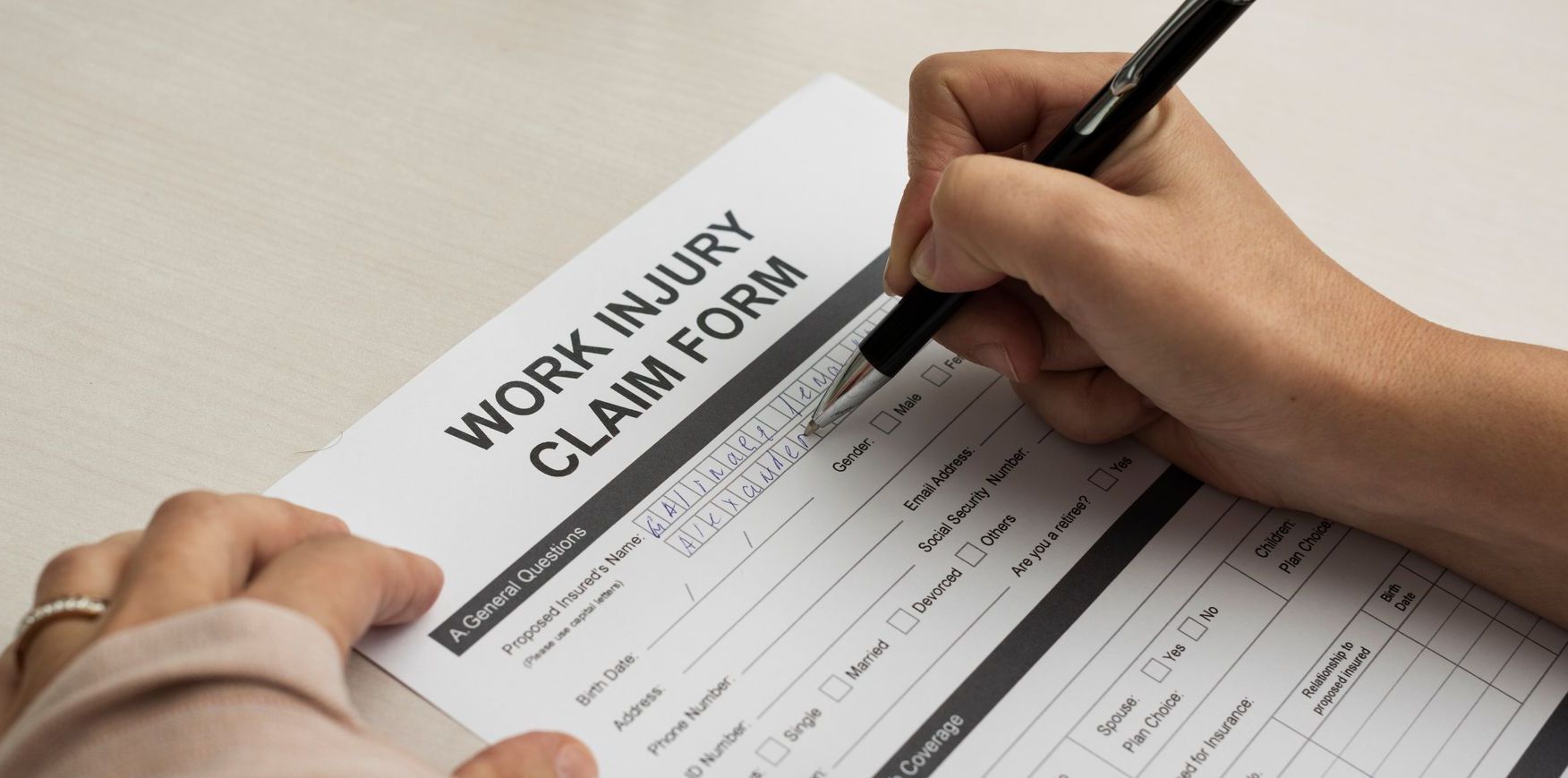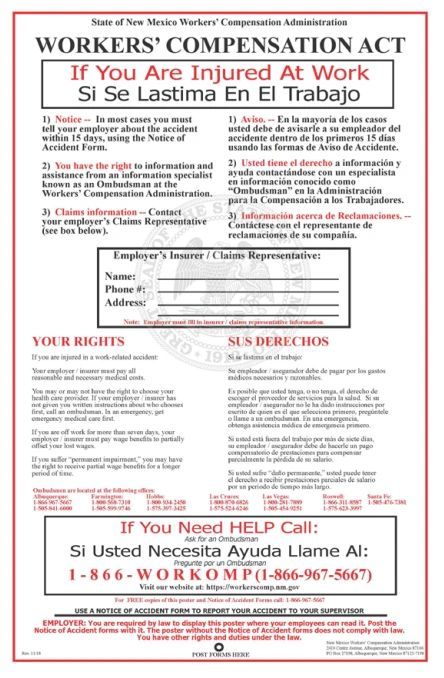Client Login
×Representación Experta en Compensación Laboral
Navegar por el sistema de Compensación para Trabajadores puede ser complejo, pero en Lueker Law, LLC, estamos aquí para guiarlo en cada paso del camino. Con casi 14 años de experiencia dedicada a la ley de Compensación Laboral en Nuevo México, nuestra firma comprende las complejidades del sistema y cómo asegurar los beneficios a los que tiene derecho.
Beneficios de Indemnización
Cuando se lesiona en el trabajo, es posible que tenga derecho a beneficios de indemnización que le compensen por los salarios perdidos. Nos aseguramos de que reciba el monto total que se merece, para que pueda mantener su estabilidad financiera durante su recuperación.
Beneficios Medicos
Los beneficios médicos cubren el tratamiento necesario para su lesión relacionada con el trabajo. Trabajamos incansablemente para asegurarnos de que sus gastos médicos estén totalmente cubiertos, incluidas visitas al médico, cirugías y rehabilitación.
Incapacidad Total Temporal
Si su lesión le impide trabajar temporalmente, puede calificar para beneficios por incapacidad total temporal. Le ayudamos a presentar su reclamo y defender su derecho a recibir estos beneficios hasta que pueda regresar a trabajar.
Incapacidad Parcial Permanente
Para las lesiones que resultan en un impedimento a largo plazo pero que no le impiden por completo trabajar, se encuentran disponibles beneficios por incapacidad parcial permanente. Le ayudamos a comprender y reclamar estos beneficios, garantizando su seguridad financiera futura.
Invalidez Total Permanente
En casos de lesiones graves que le impidan trabajar permanentemente, luchamos por su derecho a beneficios por incapacidad total permanente. Nuestro objetivo es asegurar la compensación que necesita para mantenerse a usted y a su familia a largo plazo.
Lesión de toda la Persona
Las calificaciones de lesiones de toda la persona pueden afectar los beneficios que recibe. Trabajamos con profesionales médicos para evaluar con precisión su lesión y garantizar que reciba una compensación adecuada.
Lesión Programada
Ciertas lesiones se clasifican como lesiones programadas con beneficios predefinidos. Le ayudamos a navegar por estas clasificaciones y obtener los máximos beneficios disponibles.
Exámenes Médicos Independientes
Los exámenes médicos independientes pueden afectar significativamente su caso. Lo preparamos para estos exámenes y cuestionamos cualquier evaluación injusta para proteger sus intereses.
Reservas de Medicare
Para aquellos elegibles para Medicare, ayudamos a crear reservas de Medicare para garantizar que sus gastos médicos futuros relacionados con su lesión estén cubiertos.

CAUSAS DIGNAS Y CASOS NOTABLES
01

Reclamo Por Expoliación de Terceros Debido a Una Lesión en el Trabajo en un Campo Petrolero
Durante una operación Plug & Abandon en los campos petroleros en las afueras de Portales, Nuevo México, se abrió un elevador de plataforma defectuoso, dejando caer un trozo largo y pesado de carcasa desde aproximadamente cuatro pisos en el aire sobre la cabeza y el cuello de un joven trabajador de pozos petroleros de habla hispana y Padre de dos niños pequeños. A través del descubrimiento, nos dimos cuenta de que la compañía del pozo petrolero destruyó los ascensores involucrados en el accidente y entabló una demanda por expoliación o destrucción de evidencia, una causa de acción fuera de la jurisdicción exclusiva de la Ley de Compensación para Trabajadores. Llegamos a un acuerdo de $8 millones de dólares, incluyendo acuerdos estructurados para los dos hijos del trabajador lesionado y un acuerdo en efectivo para su esposa, en la demanda por lesiones personales. En el reclamo de Compensación para Trabajadores, obtuvimos beneficios por Incapacidad Total Permanente y beneficios médicos de por vida para el Trabajador Lesionado, incluidos servicios de atención médica domiciliaria.
02

Excepción Especial de Diligencias a la Regla de ida y Vuelta en Compensación Laboral
En una reñida excepción a la regla de ir y venir, donde una editora de una publicación para tecnólogos en radiología hizo un recado especial para asistir a un simposio que había organizado, cuando fue atropellada por un conductor que iba a exceso de velocidad, lo que le provocó múltiples lesiones catastróficas que la dejó en silla de ruedas, llegué a un acuerdo de $850,000.00 en un reclamo de Compensación para Trabajadores totalmente denegado y colaboré con otro abogado que se defendió exitosamente contra un reclamo de subrogación de ERISA.
03

Apelación de Compensación para Trabajadores
Luego de una apelación exitosa, revoqué las conclusiones del Juez de Compensación para Trabajadores de que un trabajador de la construcción lesionado alcanzó la Mejoría Médica Máxima con una Calificación de Deterioro del 0% y resolví el caso después de que el Tribunal de Apelaciones sostuvo que un Informe de Examen Médico Independiente es un rumor inadmisible.
Lueker Law, LLC está listo para tomar su caso y brindarle una representación dedicada.

Contáctenos
En Lueker Law, LLC, nos dedicamos a brindar apoyo legal integral, compasivo y experto para todas sus necesidades de Compensación Laboral. Contáctenos hoy para programar una consulta y permítanos ayudarlo a obtener los beneficios que se merece.
NOTICIAS LEGALES



SU ABOGADO Y ALIADO PARA OBTENER LOS BENEFICIOS DE COMPENSACIÓN PARA TRABAJADORES QUE MERECE.
Póngase en Contacto con Lueker Law, LLC, Hoy
Representación Legal Competente y con Conocimientos








